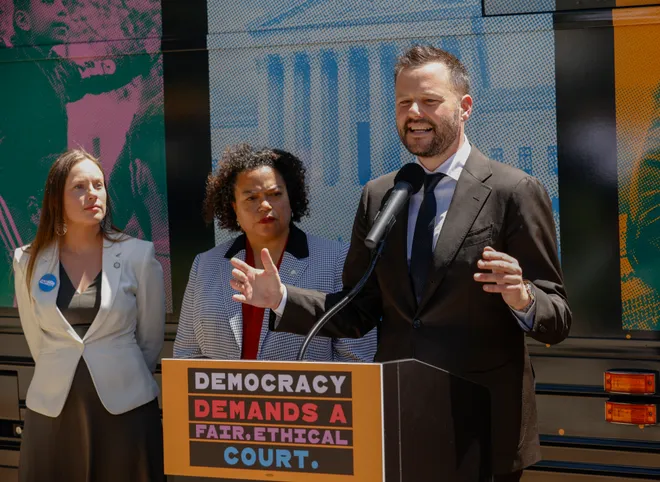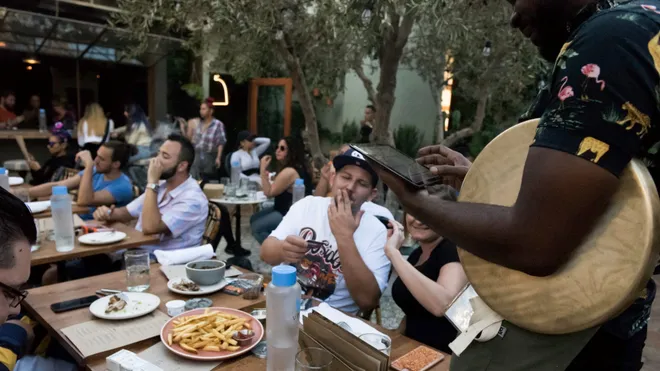California bill that would allow for cannabis cafes heads to desk of Gov. Gavin Newsom
Californians could soon be able to go to Amsterdam-style cannabis cafés across the state, ordering avocado toast or a plate of French fries to go along with their joints.
Legislation pending the approval of Gov. Gavin Newsom would allow marijuana dispensaries to transform their businesses into lounges where they can sell not only cannabis products, but also food and drinks. The bill has gotten overwhelming bipartisan support, clearing the California Senate last week in a 33-to-3 vote and the Assembly on Monday in a vote of 66 to 9.
The bill’s author, Assemblyman Matt Haney (D-San Francisco), has said that the legislation would bolster local businesses and generate more sales tax revenue for the state.
“Lots of people want to enjoy legal cannabis in the company of others,” Haney said in a statement. “And many people want to do that while sipping coffee, eating a scone, or listening to music. There’s absolutely no good reason from an economic, health, or safety standpoint that the state should make that illegal."
More California news:Massive San Francisco sinkhole forms after crews fix water main break in 74-year-old pipes
What does the bill allow dispensaries to do?

The bill comes as the legalization of marijuana continues to amass support among the public, many of whom are reporting that they have used the drug. For the first time, a record 50% of Americans said they have tried marijuana at one point in their lives, according to a Gallup survey released last month.
Modeled after cannabis cafés in Amsterdam and across the Netherlands, Assembly Bill 374 would allow dispensaries to pivot from a model that essentially makes them little more than a point-of-sale for marijuana products and paraphernalia.
Instead, the law would allow local governments such as cities and counties to license cannabis businesses to sell non-cannabis products like food and coffee and even host live music. The bill would not allow dispensaries to sell alcohol, nor would it allow coffee shops to sell cannabis.
Haney said that the Netherlands annually attracts more than 1.5 million tourists who flock to its many cannabis cafes. The country is home to more than 700 such lounges, where Haney claimed more than $1 billion dollars is spent every year.
It's that same economic boost that he hopes to inject into California's economy, where he said illegal marijuana sales regularly outpace legal cannabis businesses.
If Newsom signs it, the law would go into effect in January.

Ride-sharing:Lyft's new feature allows women, nonbinary riders and drivers to match in app
Proposition 64's legacy:Nearly 66,000 weed convictions dating back to 1961 to be dismissed in Los Angeles County
West Hollywood café became first to allow pot-smoking
The city of West Hollywood launched its own cannabis lounge program with a limited number of licenses in 2018, two years after recreational marijuana became legal in the state.
In 2019, Lowell Cafe — now called The Original Cannabis Cafe — became the first restaurant in the United States where guests could openly smoke marijuana. With its collages of vintage photographs, wooden accents and high ceilings, the café was infused with a trendy atmosphere not unlike other Los Angeles-area lounges.

The café, which according to its site remains temporarily closed, offered a diverse food menu replete with fried chicken sandwiches, banh mi and vegan nachos — but had to get creative in order to do so.
Because of the California law that allows only dispensaries to sell cannabis products, Lowell Cafe technically operated as a dispensary at the state level while operating as a “cannabis consumption lounge” on the city level. The café also kept its farm-to-table kitchen and dining area separate from its cannabis consumption area, as well as the checks guests received for food and cannabis.
It's those current regulations that Haney contends are hindering businesses, and ones he hopes go up in a puff of smoke if the governor signs the bill.
"If an authorized cannabis retail store wants to also sell a cup of coffee and a sandwich," Haney said in the statement, "we should allow cities to make that possible and stop holding back these small businesses.”
Eric Lagatta covers breaking and trending news for USA TODAY. Reach him at elagatta@gannett.com.
Disclaimer: The copyright of this article belongs to the original author. Reposting this article is solely for the purpose of information dissemination and does not constitute any investment advice. If there is any infringement, please contact us immediately. We will make corrections or deletions as necessary. Thank you.






